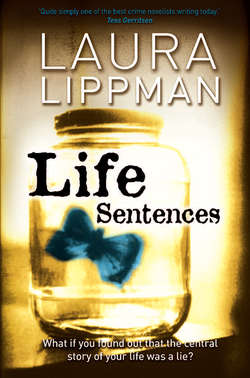Читать книгу Life Sentences - Laura Lippman - Страница 8
First Words
ОглавлениеI didn’t speak until I was almost three years old. And then it was only because my mother almost killed me. Almost killed both of us, but she had the luxury of making the decision. I was literally just along for the ride.
My mother didn’t worry about my silence, however. It was my father, a classics professor at Johns Hopkins University, who brooded constantly. The possibility of a nonverbal child—and all the other intellectual limitations that this circumstance implied—terrified my father so much that he would not allow my mother to consult specialists. He knew himself well enough to understand that a diagnosis could change his love for me. My father believed in unconditional love, but only under certain conditions.
Besides, he was not irrational to hope that I might be keeping my own counsel for as yet undisclosed reasons. I had walked early and hit the other developmental milestones more or less on time. And I wasn’t mute. I had a three-word vocabulary: yes, no, and Ric, which is how my father, Cedric, was known. I’m not sure why I had no term for my mother. Perhaps ‘Lenore’ was too subtle for my baby mouth. More likely, I didn’t recognize that my mother was a separate entity but saw her as my larger self, capable of detaching from my side in order to meet my needs. With her, I didn’t even use my three paltry words, instead pointing and grunting to indicate my desires. ‘We should have named her Caliban instead of Cassandra,’ my father said.
My refusal to speak continued until almost a month before my third birthday. It had snowed, an early-spring snowstorm that was uncommonly common in Baltimore. On this particular day—a Thursday, not that my three-year-old mind could distinguish days, but I have checked the family story against newspapers from that week—my mother set out to do the marketing, as she called it then, at the old Eddie’s supermarket on Roland Avenue.
The snow had started before she set out, but the radio forecaster was insisting it would not amount to much. In the brief half hour she shopped, the snow switched to rain, then changed over to sleet, and she came out to a truly treacherous world, with cars spinning out of control up and down Roland Avenue. She decided that the main roads would be safer and calculated a roundabout route back to our apartment. But she had forgotten that Northern Parkway, while wide and accommodating, was roller-coaster steep. The car slithered into its left turn onto the parkway, announcing how dangerous her choice was, but it was too late to turn back. The unsanded road lay before her, shining with ice, a traffic light at its foot. A traffic light at which she would never be able to stop. What to do?
My pragmatic, cautious mother killed the engine, took her foot off the brake and coasted down, turning our car, a turquoise-and-brown station wagon, into a toboggan. I bobbled among the sacks of groceries, unmoored and unperturbed. The car picked up speed, more speed than my mother ever anticipated, yet not enough to get her through the intersection before the light changed to red. She closed her eyes, locked her elbows, and prayed.
When she opened her eyes, we had come to rest in the tiny front yards of the houses that lined Northern Parkway, shearing off a hydrant, which sent a plume of water into the air, the droplets freezing as they came back to earth, hitting our car like so many pebbles. But the last might be a detail that my father added, as he was the one who told this story over and over. Careful Lenore, rigid Lenore, skating down a hill with her only child in the back of the car. My mother could barely stand telling it even once.
That night, at dinner, decades later as far as my mother was concerned—after the police came, after the car was towed, after we were taken to our apartment in a fire truck, along with the groceries, not so much as an egg cracked—my father finished his characteristically long discourse on his day in the groves of academe, which my father inevitably called the groves of academe. Who had said what to whom, his warlike thrusts, as he called his responses, an allusion to Maryland’s state song. His day finally dispatched, he asked, as he always did, ‘Anything to report from the home front?’
To which, I am told, I answered, although not in a recognizable language. I babbled; I circled my pudgy baby arms wildly, trying to simulate the motion of the car. I patted my head, attempting to describe the headwear of the various blue-and yellow-suited men who had come to our rescue. I even did a credible imitation of a siren. Within twenty-four hours, my words came in, like a full set of teeth.
‘And from that day forward,’ my father always says at the end—‘From that day forward’—he is a great one for repeating phrases, for emphasis—‘from that day forward, no one could ever shut you up.’
From My Father’s Daughter by Cassandra Fallows, published in 1998 and now in its nineteenth printing.
